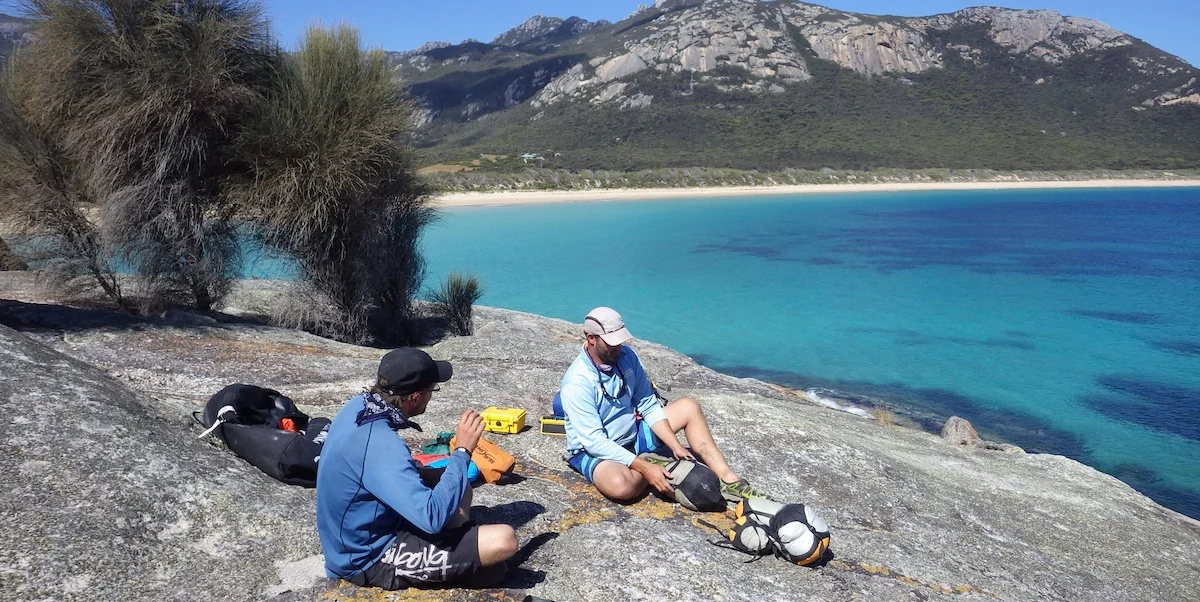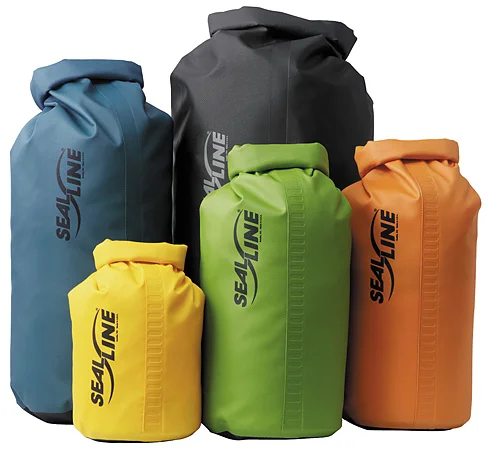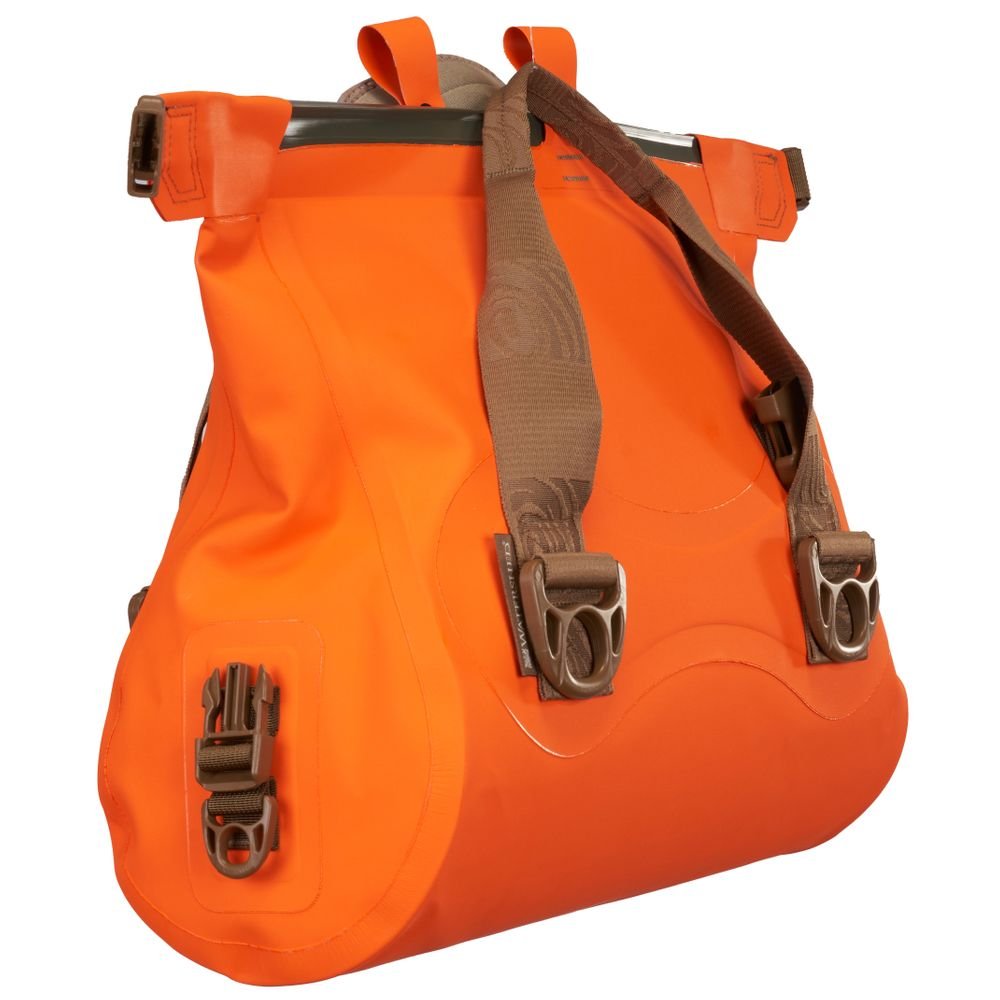The Truth About Dry Bags...
There is a wide variety of dry bags, sacks & cases - used to protect all sorts of gear. Come along to our Show and Tell sessions to learn more about dry bags and packing your kayak.
Follow the links below for the dry bags we use and recommend for a multitude uses when kayaking or canoeing:
SealLine Baja Dry Bag
Sea to Summit Lightweight Dry Sack
Sea to Summit Compression Dry Sack
Sea to Summit Stuff Sack
Aquapacs
Pelican Cases and Microcases
Watershed Bags
SealLine Baja™ Dry Bag
“hmmm...Semi Dry…Bag”
SealLine Baja Dry Bags are extremely durable bags, lasting in a commercial setting 10+ years. I am still using a 5L and 20L dry bag I was given on my 15th birthday! In my sea kayaking kit I commonly use 2x 5L dry bags, 1x 10L and 1x20L bags.
As of 2024, we can no longer get the Baja Bags, so they are being replaced by SealLine Discovery Dry Bags - almost as thick & durable.
As with the lightweight dry bags, this much heavier weight bag relies on folding over the opening and clipping it closed so it is not a perfect seal if the bag is immersed.
Sea to Summit Lightweight Dry Sack
“hmmm...Semi Dry…Bag”
These dry bags are of a lighter weight fabric so they weigh less but are not as durable as the Baja bags. In a commercial setting (ie. frequent use) they last 2 years.
Sea To Summit Lightweight Dry Sacks are available in a range of sizes: 1.5, 2, 4, 8, 13 and 20 litre. I commonly use an 8L for my Sea to Summit Comfort Plus Sleeping Mat. They are useful for a range of soft items such as clothes and food - nothing with sharp edges to poke through the bag.
When sealing them up, squeeze as much air out as possible and fold the top over at least three times before clipping the buckle. The watertightness of these bags is not perfect as they rely on merely being folded and clipped - there is no watertight seal so if the bag is likely to be immersed (in a canoe, open kayak or stowed in cockpit) you should use additional waterproofing methods such as lining with a tied-off heavy duty garbage bag.
To prolong the life of your lightweight dry bags ensure that your fore and aft compartments are clean of sand and there are no exposed sharp points (such as the deck fittings screws) to tear or abrade the bags.
Sea to Summit Compression Dry Sack
“I am Very impressed…Can’t get enough of them. I have not yet had a wet sleeping bag."
I can’t get enough of these - I use a Compression Dry Sack for sleeping bags, puffy jackets, clothing, wet weather clothing, fly sheets and tents. They have never leaked! Even in wet plastic sea kayaks! In extremely wet kayaks/canoes or an environment such as the Alaskan rainforest, I do however use a heavy-duty trash bag to make sure they are completely 100% waterproof.
For thicker down sleeping bags the Medium size (13L) is recommended, while for those with less loft a Small size (8L) will fit.
Sea to Summit Stuff Sack
“A Great way to make a Dry Bag”
Stuff sacks close with a drawstring so they are not actually a dry bag in themselves. They can, however, be converted to a dry bag using a heavy duty garbage bag - squeeze the air out, then twirl and knot the end of the garbage bag for a firm seal.
Our Youtube shows how this is done:
How to Make a DRY Bag - Sea to Summit Stuff Sack
Aquapacs
“Use you mobile/cell phone anytime, anywhere... Provided there is reception!”
These small bags are best suited to electronics that you might want to access on the water: phones, VHF radios and GPS units as they have a clear plastic window and allow use of a touchscreen through the plastic. They come in a variety of sizes and colours - Aquapac 608 Keymaster (waterproof wallet/ keys), Aquapac 358 and Aquapac 368 (larger phones & Garmin GPSMAP 78sc/79sc). Some of these waterproof cases are also available as armbands.
There are also waterproof cases for small and larger sized VHF radios (228 & 248).
The bag works on a clamp system and is rated at IPX8 - submersible to 5 metres. It comes with a lanyard - as with anything that is not stowed away you should attach it to something, such as your Life jacket (lark’s-foot to the strap) - tuck it away between your body and the life jacket so it is cushioned if you are scrambling back onto your kayak after a capsize..
The seal deteriorates over time with frequent use so best to retire after a period of use & they can then be used as storage for small items. I personally downgrade my Aquapacs every 6 months, and use them for items such as passports, head phones, USB devices which will also be stored in turn inside my Watershed Ocoee duffel bag.
Aquapac offer a 5 year warranty that covers the bag only, not the contents, so inspect your Aquapac regularly and replace when it shows signs of wear.
Pelican Cases and Microcases
“Impact protectors”
Pelican Microcases work as great impact protectors, but they can start to leak over time, especially when sand and grit gets stuck around the seams/o-rings. I use them for items that are already water resistant such as my camera and HandiCam.
The 1020 microcase is converted to a battery box as part of our Electronic Bilge System.
Pelican Cases - These cases are almost indestructible, water- and impact-proof. I utilise the Pelican 1120 case for communications equipment - satellite phone and flares. These cases are rigid and can be difficult to pack in tight places so I limit them to essential items that must be protected from crushing.
Watershed Bags
“Bomber - it is the true Dry bag”
Watershed - I am so impressed with these bags - they are quite expensive but well worth it: soft and easy to load, extremely watertight. To maintain this seal, use 303 Aerospace Protectant (or in a jam, Olive Oil).
I do not leave home without my Ocoee duffel bag. It carries wallets, phones, batteries, passport and a variety of small electronic devices that must be kept dry. The duffel has four clips to compress down so it can be easily stowed. Padded liners, dividers for camera attachments and a shoulder strap are available as well.
The Aleutian Deck Bag is amazing in field/commercial situations. It is carried on the front deck of the kayak - visible to all, carrying the first aid kit, medical summaries, float plan and rescue equipment such as flares (Marine Safety Pack).
The Largo Tote Bag is a bigger bag than the Ocoee Duffel and is ideally suited to boat-based activities rather than sea kayaking as it is a bit big (31.75 Height x 36.8 Width x 15.2 Depth) for a sea kayak hatch but would be great to keep precious gear in if rafting, canoeing, boating or even SUP. It holds 19.5 litres and has a 45cm opening.
Watershed also has a range of waterproof backpacks - ideal for those packrafting adventures. My Big Creek Backpack is only really used on my Trak Adventures, for Fishing Kit and Cooking Kit and bits & bobs, as it can be loaded on the back deck of a kayak and remains very water tight. Backpacks can be ordered in (allow a couple of weeks) - larger backpacks are the Westwater and Animas. Larger duffels: Chatooga, Colorado, Yukon and Mississippi are in stock and are suited to your canoeing and rafting adventures.
Waterproofing Tips and Tricks
Dry bags that seal by fold & clip are not designed for prolonged immersion - anything vital should be contained within at least two (preferably 3) layers of water-proofing or in Pelican case/ Watershed bag
The degree of waterproofing of a bag can be improved using a strong garbage bag - twist the ends and tie off.
See our Youtubes:
How to Make a DRY Bag - Sea to Summit Stuff Sack
How to Waterproof your Sleeping BagMake sure the inside of your kayak’s hatches are clean of sand and sharp points that can abrade you dry bags. A blob of sikaflex or silicon sealant over any exposed screws will help protect from snagging.
After 6 months of heavy use, Aquapacs should be retired from their primary use protecting your phone or GPS unit, to use as a second line of defence holding small items such as keys, leads, USB drives inside another dry bag.










